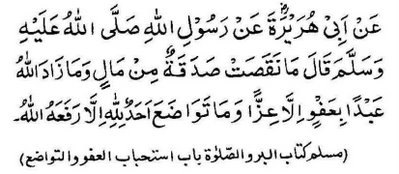
Abu Huraira reported Allah's Messengersaw as saying: Charity does not in any way decrease the wealth and the servant who forgives, Allah adds to his dignity, and the one who shows humility Allah elevates (Raf'a) him.
Imam Muslim accepts the authenticity of this hadith and includes it in his collection. Tirmazi and Nisa'ee have also reported it.
Clearly, raf'a means elevation of spiritual rank. When a person assumes humility, Allah raises his spiritual station.
When the Jews planned to kill Jesus by crucifying him, they intended to subject him to an ignoble and accursed death. A type of death that would prove him to be a false prophet. This is the key point and helps explain the Quranic usage of the word Raf'a to describe Jesus' fate. Raf'a is the exact opposite of accursed. According to the Torah, anyone dying on the cross dies an accursed death.[1] Such a person cannot possibly be a prophet of God. Allah absolves Jesus from that allegation and adjudges his fate to have been exactly the opposite: a noble death and elevation of spiritual rank. Furthermore 3:56 clearly establishes an order of events. Raf'a happens after Tawaffa (death). So whatever be the meaning of raf'a, Jesus would need to die before he is subjected to Raf'a. This is conceded to by Allama Shokani in his book Fatah-ul-Qadeer; by the Egyptian scholars Sheikh Muhammad Abdah and Mustafa Muraghi in their commentaries of the Holy Quran and by Shia scholar Allama Qammi in his book Akmaaluddin.
Lisan-ul-Arab, the authoritative Arabic dictionary, describes raf'a as being antonymous to lowering of rank, dignity or significance. It describes God's attribute of Al-Rafay to mean the One who raises the status of ordinary believers and to the aulia (highly spiritual people) He grants His nearness through their raf'a.[2]
This word is extensively used in hadith. Holy Prophet Muhammadsaw once said, “When someone assumes humility Allah causes his raf'a to the seventh heaven.”[3] Other traditions elaborate further by stating that this is bisilsilati i.e. in stages.[4]
In another hadith, Holy Prophet said that when a person assumes humility for the sake of Allah, Allah raises (raf'a) his status degree by degree until a he is raised to a lofty station (aliyeen). And when a person displays arrogance Allah debases him until a time comes when he is counted among the lowest of the low (asfala safileen).[5]
This tradition also finds mention in the Shia literature. In fact Shia literature employs other sublime usage of this term as well. It is said that when Jaffar Tayyarra presented himself in the court of Najashi, the king of Abyssinia was sitting on the floor. Jaffar (expecting the king to be on his throne), enquired as to why he was seated on the floor? Najashi replied that it is Jesus' teaching that when God grants favor to a man, man should assume meekness. I am being meek since God gave me a victory. When the Holy Prophetsaw learnt of this incident, he said that meekness raises the status of a man, therefore be humble such that Allah raises your station (gives you raf'a).[6]
Holy Prophetsaw used to pray between salaat prostrations that Allah may grant him raf'a (wa-Raf'ani).[7] If it is assumed that raf'a means physical elevation to the heavens, it would mean this particular prayer of the Holy Prophetsaw was not accepted (naoozo billah), whereas those who believe Jesus to be still alive, say that Jesus' prayer for deliverance from persecution was accepted by raising him to the heavens.[8] This should be an unacceptable proposition for any Muslim.
In the commentary of 55:30 -- Every day Allah reveals Himself in a different state -- Saheeh Bukhari states that each day Allah exaltes (gives raf'a to) many nations and many nations does He humiliate.[9]
Therefore, in the light of this evidence one can conclude that raf'a means exaltation of spiritual rank, and it is in this sense that Jesus Christ was given raf'a. Hazrat Ibne Arabi commenting on 4:159 writes that raf'a of Jesus means seperation of his soul from the binds of earthly existence and finding its place in the celestial world close to (Allah).[10]
Any tradition that suggests a physical ascension of Jesus would be considered unreliable as it would be against the Quran and the authentic traditions. Unitarian Christians of the past also believed Jesus to have died.[11] The present day belief of a living Jesus is a later Christian invention. Several Muslim scholars agree that the belief in Jesus being still alive was adopted by Muslims of the middle ages in error. These scholars include the following: Allama Ibne Qayyam, Allama Zurqani, Nawab Siddiq Hasan Khan, Abul Kalam Azad, Allama Ubaidullah Sindhi, Sir Syed Ahmad Khan and Ghulam Ahmad Perwaiz.
[1] Deutronomy 18:20, Deutronomy 21:22–23
[3] Kanzul Amaal by Allama Allauddin Ali Mutaqqi vol. 3, pg. 110, pub. Moassatur-Risalah.
[4] Kanzul Amaal vol. 2, pg. 26, pub. Dairatul Maarif Al-Nizamia Hyderabad Dakkan.
[5] Masnad Ahmad bin Hambal vol. 3, pg. 76, pub. Darul Fikr Al-Arabi.
[6] As-Saafi Sharah Usool Al-Kafi pg. 220-221, pub. Munshi Nawal Kishvar, Lucknow.
[7] Ibn-e-Majah vol. Aqamat-as-Salaat, chap. Ma Yaqoolu Baina Sajdatain.
[8] (i) Tafseer Jame' Al Bayaan by Allama Mohammad Bin Jarir Tabri vol. 3, pg. 290, pub. Mustafa Al Babi Al Jilli, Egypt. (ii) Bihar ul Anwaar vol. 16, pg. 144, pub. Maoosasta Al Wafa, Beirut.
[9] Saheeh Bukhari, Kitab-ul-Tafseer, Surah Rahman.
[10] Tafseer Quran-al-Kareem by Allama Ibne Arabi vol 1, pg. 296, pub. Darul Undalas, Beirut
[11] (i) Dalail An-Nabuwah by Allama Abu Bakr Bahiqi (d. 458 h) vol. 1, pg. 438, pub. Lajna Ahya-ul-Umahat Kutub 1970, (ii) Asbab Al-Nazool by Allama Wahidi (d. 468 h), pg. 61, Darul Fikr, Beirut
